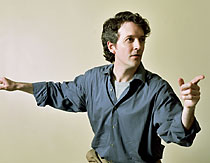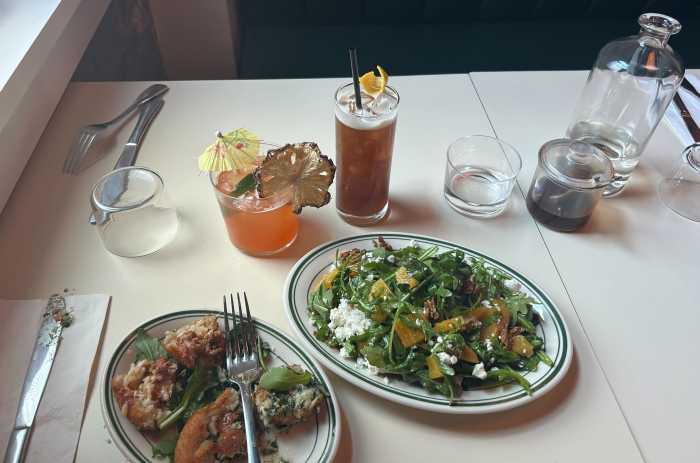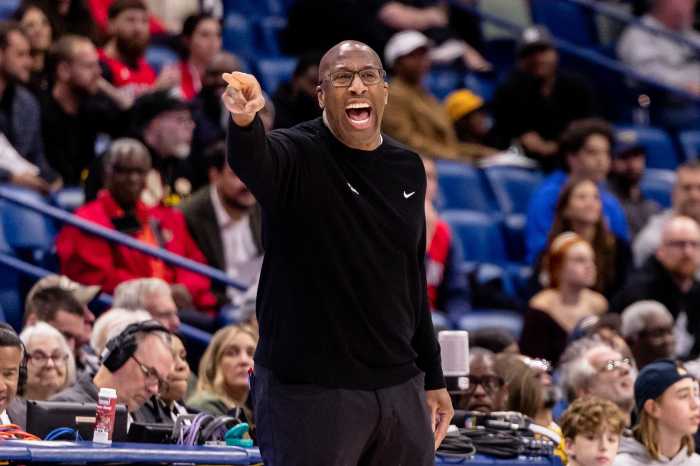People who love baseball and hate George
W. Bush may find much of interest in Paul Boocock’s "Boocock’s
House of Baseball" at The Flea Theater in SoHo but there’s
not much else to recommend the one-man show.
This is the Park Slope writer-actor’s second political piece
and his second collaboration with director Mary Catherine Burke.
Their first show, "Boocock=VP," also used some baseball
material, but it was mostly political commentary. "Boocock=VP"
focused on how much better it is to be vice president than president
because the VP gets all the glory and none of the blame.
"Boocock’s House of Baseball" is all about what used
to be America’s favorite pastime (until basketball and football
came along) and what’s become of it at the hands of greedy owners
and troubled players. But there’s something forced about the
way Boocock insists on seeing current events through the prism
of the game. One can’t help but think he could just as easily
have made analogies with the game of chess (the battles, the
maneuvers, the royalty and the pawns, the settling of old grudges
when the pawns make it to the other side) or "ring-around-the-rosy"
(the triumph of fate when they all fall down).
Boocock’s monologue includes the stories of Babe Ruth, Reggie
Jackson, Darryl Strawberry, Doc Gooden, Pete Rose and many more.
He covers drug use, illegal gambling, racism and other issues.
But none of these stories are told in enough depth to be interesting,
without huge amounts of background information brought to the
plate by the members of the audience.
Performing against the backdrop of an American flag with baseballs
substituting for stars, Boocock adds as much physicality as he
can to a basically narrative show. He dances, mimics and mimes.
Burke has done an admirable job keeping him moving.
But Boocock is not a wonderful dancer, and his Ronald Reagan
sometimes morphs into Dubya (although, proving all Republicans
don’t sound alike, he really nails it with Dick Cheney). And
after the fifth time Boocock pretends he’s up at bat and swings
at an invisible ball, the novelty (if there ever was any) wears
thin.
When Boocock tries to equate baseball with politics, the analogies
are mostly verbal tics. "Shock and awe won’t work in baseball,"
he says and later talks about an "Enron Stadium." He
describes baseball as an "advanced form of democracy and
democracy as a team sport."
Was Rose’s passion for gambling really a way of being patriotic?
Did Strawberry’s substance abuse problem have anything to do
with racism or the fact that Ty Cobb was a member of the Ku Klux
Klan? Can we really blame the Yankees’ failure to win the World
Series in the past few years on the president?
When we really love something or someone we tend to see the world
as centered on the object of our affections. That’s why amorous
people are sometimes called "lovesick." Clearly Boocock
loves baseball. But is it fair to ask an audience of strangers
to share his obsession?
Monologues are strenuous undertakings. Solo performers succeed
on the strength of their personalities or the personalities they
create. Boocock reveals nothing of interest about himself, except
that he has a love-hate relationship with baseball and a hate-hate
relationship with George W. Bush and his administration. Nor
does he tell the audience anything truly compelling about either
players or politicians.
An hour of "Boocock’s House of Baseball" felt like
a game that went into too many extra innings.
"Boocock’s House of Baseball"
plays through July 23, Thursday through Saturday, at 8 pm at
The Flea Theater (41 White St. between Broadway and Church Street
in Manhattan). Tickets are $15. For tickets, call Theater Mania
at (212) 352-3101 or visit www.theatermania.com.

























